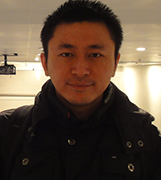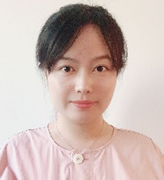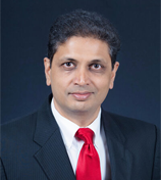ICNGN2022 Are Sincerely Inviting Speakers! If you would like to join us, please send us your CV by: [email protected].

Professor Yanfeng Jiang received his undergraduate degree in 1993 from the Department of Electronic Engineering, Southeast University, and Ph.D. degree of Microelectronics and Solid-electronics from Lanzhou University in 2000, a postdoctoral fellow in the Key Laboratory of MEMS, Ministry of Education, Southeast University from 2000 to 2002. An Associate Professor and a Professor at North China University of Technology from 2002 to 2010, and a Research Fellow a Department of Electrical and Computer Engineering at the University of Minnesota System from 2010 to 2016. Now, he is a Professor at School of Internet of Things Engineering, Jiangnan University.
Prof. Jiang Chaired more than 10 national and provincial scientific research projects, including the general program of National Natural Science Foundation of China, Beijing Science and Technology Program, etc., won more than 10 provincial and ministerial level scientific and technological achievements awards, published more than 200 papers, other-citation more than 2000 times.

Dr. Rui Han is an associate professor and PhD supervisor at the School of Computer Science & Technology, Beijing Institute of Technology (BIT). Before joining BIT in 2014, He received MSc with honor in 2010 from Tsinghua University, China, and obtained his PhD degree in 2014 from the Department of Computing, Imperial College London, UK. His research interests are cloud and edge computing, big data systems, and system optimization for highly parallel workloads (in particular big data analytics and deep learning applications). He has over 50 publications in these areas, including papers at ACM MobiCom, TC, TPDS, TKDE, TDSC, INFOCOM, ICDCS, ICPP, CCGrid, and CLOUD.
Dr. Rui Han also acts as the technical advisor in a list of companies, including ThunderSoft (Edge computing), SudoPrivacy (Data privacy), and Transwarp (Big data systems), and closely collaborates with companies such as Tecent, Midea, and CASICloud.

Rui Gao received the Doctor of Science (Tech.) degree in automation, systems and control engineering from Aalto University, Finland, in 2020, and conducted postdoctoral research at the University of Cambridge, UK in 2021. Since 2022, she has been serving as an Assistant Professor at the School of Naval Architecture Ocean and Civil Engineering, Shanghai Jiao Tong University. Her research interests include autonomous systems, state estimation, and machine learning algorithms.

Prof Xiaodong Liu has been very active in the research in AI-driven software engineering, focusing on pervasive systems (Internet of Things), service-oriented architecture, evolution of cloud services, and intelligence-driven smart systems. He has won 12 external grants and successfully led or leading these externally funded projects with the role of principal investigator. Currently Prof Liu leads the Intelligence-Driven Software Engineering Research Group. He is the founder a spin out company, FlexiCAGE Ltd. He has published 160 papers in refereed international journals and conferences and 5 book chapters. He is the inventor of 1 patent in Generative Component Adaptation registered in UK, USA and at International Level (PCT). He has been the chair, co-chair or PC member of a number of IEEE and IASTED International Conferences. He is the associate editor of 2 international journals and the editorial board member of 3 international journals. He is the chief editor of 3 IGI Global Research Handbooks. He is the regular reviewer of other 6 international journals. He is a senior member of IEEE Computer Society, and a member of British Computer Society.

Ljiljana Trajkovic received the Dipl. Ing. degree from University of Pristina, Yugoslavia, the M.Sc. degrees in electrical engineering and computer engineering from Syracuse University, Syracuse, NY, and the Ph.D. degree in electrical engineering from University of California at Los Angeles. She is currently a professor in the School of Engineering Science, Simon Fraser University, Burnaby, British Columbia, Canada. Her research interests include communication networks and dynamical systems. She served as IEEE Division X Delegate/Director and President of the IEEE Systems, Man, and Cybernetics Society and the IEEE Circuits and Systems Society. Dr. Trajkovic serves as Editor-in-Chief of the IEEE Transactions on Human-Machine Systems and Associate Editor-in-Chief of the IEEE Open Journal of Systems Engineering. She is a Distinguished Lecturer of the IEEE Circuits and System Society and the IEEE Systems, Man, and Cybernetics Society. Dr. Trajkovic is a Professional Member of IEEE-HKN and a Life Fellow of the IEEE.

Marcin Paprzycki has received his M. S. Degree in 1986 from Adam Mickiewicz University in Poznan, Poland, his Ph. D. in 1990 from Southern Methodist University in Dallas, Texas and his Doctor of Science Degree from Bulgarian Academy of Sciences in 2008. Presently he is serving as an Associate Professor, Systems Research Institute, Polish Academy of Sciences, Poland. His initial research interests were in high performance computing and parallel computing, high performance linear algebra in particular. Over time they evolved toward distributed systems and Internet-based computing; in particular, agent systems. He has published more than 500 research papers (see: https://scholar.google.com/citations?user=OWSryNQAAAAJ&hl=en&oi=ao) and was invited to Program Committees of almost 900 international conferences. He is on the editorial boards of 14 journals. He is senior member of the ACM and IEEE, Senior Fulbright Lecturer, IEEE CS Distinguished Visitor. More information can be found at: https://www.ibspan.waw.pl/~paprzyck/

Sanjay Ranka is a Distinguished Professor in the Department of Computer Information Science and Engineering at University of Florida. His current research is on developing algorithms and software using Machine Learning, Internet of Things, GPU Computing and Cloud Computing for solving applications in Transportation and Health Care. He is a fellow of the IEEE, AAAS, and AIAA (Asia-Pacific Artificial Intelligence Association) and a past member of IFIP Committee on System Modeling and Optimization. He was awarded the 2020 Research Impact Award from IEEE Technical Committee on Cloud Computing. He was also awarded the 2022 Distinguished Alumnus Award from Indian Institute of Technology, Kanpur. His research is currently funded by NIH, NSF, USDOT, DOE and FDOT.
From 1999-2002, as the Chief Technology Officer and co-founder of Paramark (Sunnyvale, CA), he conceptualized and developed a machine learning based real-time optimization service called PILOT for optimizing marketing and advertising campaigns. Paramark was recognized by VentureWire/Technologic Partners as a Top 100 Internet technology company in 2001 and 2002 and was acquired in 2002.

Jawad Haqbeen is an Assistant Professor in the Department of Social Informatics at Kyoto University. His research is about social informatics and its applications like facilitating opinion and consensus-building using Artificial intelligence. He uses conversational AI to study collective discussion, intelligence, and decision-making in online communities. Jawad is a recipient of the Best Presentation Award in KICSS-21, the IBM Research Excellence Award in PAAMS-20, the Best Paper Award in KICSS-20, and the IEEE Nagoya Branch Best Research Presentation Award in 2018, the Japanese Government MEXT Scholarship in 2015, and Japanese Government JICA Scholarship in 2011. Jawad served as a program committee member in leading AI conferences such as AAAI-23, PRIMA-22, and ACAN-22 and reviewer for AI journals such as Applied Artificial Intelligence and Group Decision and Negotiation. In addition, Jawad has been the local arrangement and tutorial chair for international conferences such as IEEE ICA-23, PRIMA-22, KICSS-22, PRICAI-21, and KICSS-20. He holds a Ph.D. and MSc. in Computer Science from Nagoya Insitute of Technology, and Waseda University, Japan.
D-Agree: A Discussion Tool to Improve Large-Scale Online Discussion
Online communities are considered one of the main streams for idea generation by large-scale online discussion tools, and these tools are considered as next-generation democratic venues for people to express their opinions collectively. Facilitating discussion and extracting meaningful information from individual opinions to community opinions is valuable and critical for establishing and maintaining coherent large-scale discussions for social good. Such platforms require support functions that can efficiently facilitate discussion, reasonably integrate ideas, and finally help people to achieve a consensus on common concerns.
In this tutorial, I will introduce D-agree's design, development, and real-world application, a text-based discussion support system based on an automated facilitation agent. I will begin by showing the D-Agree architecture, explicitly talking about the mechanics of conversational agent and argumentative structure extraction in D-Agree, such as how automated facilitation, node classification and link prediction tasks can benefit civic discussion, and then extend the talk into the application by showing the results of social and controlled experiments.
At last, I will discuss that how adopting such a system can benefit participatory and deliberative democracy in online communities, particularly in the least developed countries such as Afghanistan.
Copyright © 2022 - All Rights Reserved - ICNGN